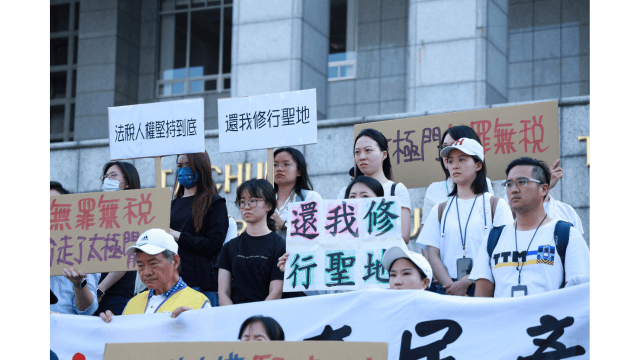Truly independent judges would rule on the basis of the law only, not political pressures, media, or “public opinion.” They would have solved the Tai Ji Men case long ago.
by Daniela Bovolenta*
*A paper presented at the webinar “The Judiciary, Freedom of Religion or Belief, and the Tai Ji Men Case,” co-organized by CESNUR and Human Rights Without Frontiers on January 11, 2025, Taiwan’s Judicial Day.

The Judicial Day in Taiwan celebrates the independence of the judiciary in the Republic of China from foreign powers. It has become an opportunity to reflect on the independence of judges in general. This independence is now under attack from various quarters.
In non-democratic states, judges are not independent. They are supposed to enforce the will of the ruling party or the dictator. The independence of the judiciary is perceived not as a resource but as threat to the totalitarian power oppressing the country.
However, there are attacks against the independence of the judiciary also in democratic countries. Some come from politicians who do not want to submit themselves to the control of the courts, although the symmetric risk also exists that some judges may act without respect of the prerogatives of the executive power.
Today, however, the worst risk comes from the media, which present their own representation of the so-called public opinion. The judges may be tempted to decide not on the basis of the law but of what the media and the social majority expect from them.
I work in Italy with a research center commemorating the figure of Judge Rosario Livatino, who was killed in 1990 by organized crime in Italy at the young age of 37. His life and work were deeply inspired by Christian values—so much so that in 2021 he has been beatified by the Catholic Church.

Livatino was keenly aware of the need to preserve the judiciary from the subtle assault to its independence conducted by the media as self-appointed representatives of the “court of public opinion.” He wrote that “there can be no relationship whatsoever between the function of the magistrate and the changing society, in the sense that the former is not to undergo any modification, whatever the alleged whims of the latter.” The independent magistrate cannot, therefore, be a “social sensor,” “called upon to go along with changes, or remove obstacles to social changes.” This independence may be difficult, but is crucial for the judge. “The independence of the magistrates is their credibility,” Livatino wrote, “which they succeed in conquering in the travail of their decisions and at every moment of their activity …The judges at all times must be and appear free and independent, and so much can be and appear so if they themselves want it, and they must want it in order to be worthy of their functions and not to betray their mandate.”
These reflections are also important for Taiwan and the Tai Ji Men case. A strict and independent application of the rule of law should have led judges in Taiwan, including administrative judges, to acknowledge that Tai Ji Men is not a cram school, that the gifts given by disciples (dizi) to their Grand Master (Shifu) are not taxable, and that Tai Ji Men is and has always been not guilty of tax evasion.

Why did some Taiwanese administrative judges, up to the recent unfair decision of the Taichung High Administrative Court last year, rule against Tai Ji Men? It seems that they ruled against justice, against fairness, against the rule of law, and even against common sense. The answer is that these judges are not really independent. They may proclaim their independence formally, but substantially they are not independent. They are influenced by politicians and tax bureaucrats who need to prove that they were right in abusing Tai Ji Men and want to save face. And they are influenced by an old media slander campaign created by an ill-intentioned prosecutor when the Tai Ji Men case started in 1996 and whose effects are still felt.
This is not independence of the judiciary. Truly independent judges would ignore political and bureaucratic influences. They would ignore the media. They would not ask themselves what some politicians or bureaucrats or media expect from them but what is right, fair, and in accordance with the rule of law. If they were really independent, they would rule in favor of Tai Ji Men and close the decade-long case. If they rule against Tai Ji Men, this proves they are not really independent.
In this Judicial Day 2025, let’s call for a real independence of all judges in Taiwan, including administrative judges, and let’s call for justice, at last, for Tai Ji Men.




